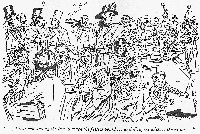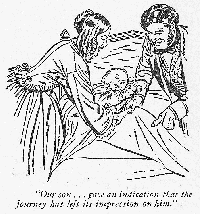|
MAY 25, 1854 - We have just returned from
Madison, the State capital, my first rail journey since the trip from
Milwaukee to Waukesha more than three years ago. Although many of our
neighbors considered this venture a great extravagance, we felt quite
justified inasmuch as we have received unusually good returns from the
sale of our grain and produce this past year.
I am fearful that my wife found the journey
somewhat trying because of our son, now 10 months of age, but we both took
pride in the knowledge that he undoubtedly was the most youthful of the
passengers aboard the Milwaukee & Mississippi train which was making its
initial trip from the nearby metropolis to the capital. It was most
refreshing to escape momentarily the sometimes arduous tasks of farming.
Before recording events of the trip I will
note here that the Rail Road Company has undergone changes since last I
wrote of it. In the preceding two years there has been much divergence of
opinion among the officials of the company pertaining to certain financial
matters. As a result, Mr. Byron Kilbourn no longer is President but has
been supplanted by Mr. John Catlin, a Vermonter approximately 50 years of
age. Mr. Catlin, I understand is a persevering man of exceptionally varied
talents and capabilities.
Our entry into Madison two days ago was a
most gala occasion. The train, arriving at 2 P.M., was welcomed at the
depot by Col. A. A. Bird, one of the oldest and most venerable citizens of
the capital. Also there were many brass bands (our son was somewhat
distressed at the noise of so many horns), fire companies, members of the
clergy, the editors and employees of the press and representatives of many
civic organizations. As we disembarked, a procession began to Capitol Park
with both the visitors and residents of Madison participating. My wife and
son wisely proceeded directly to the Capital Hotel, she feeling that a
rest would avail both of them strength for the balance of the journey, but
I, of course, went with the marchers. At the park a free collation was
served up under the direction of Mr. Stevens, the proprietor of the
Capital Hotel. I should record at this point that our train consisted of
32 cars, drawn by two locomotives, so whereupon the good citizens of
Madison had prepared to receive 650 people, there actually were more than
2,000 of us including visitors from the nearby countryside.
The Madison Argus and Democrat in its
edition of yesterday chronicled the results of this unforeseen
circumstance and from that publication I herewith quote:
"Those who were so fortunate as to arrive
at the table first [the banquet prepared for us at the Capital Hotel]
succeeded in satisfying their appetites [but] there was a great deal of
grumbling about the scantiness of the supplies of provisions ... It was a
profitable day for the Rail Road, if for nobody else. Their receipts from
passengers alone could not have been less than $2,500 ...The expectation of
the morning made way for the excitement of the afternoon and that for the
weariness and discontent of the evening. But few went to bed drunk, and
none satisfied."
 Needless to say, I was not among the last
to reach the festive board. I considered the situation handled admirably
and disagree heartily with the editor of the Argus and Democrat. Needless to say, I was not among the last
to reach the festive board. I considered the situation handled admirably
and disagree heartily with the editor of the Argus and Democrat.
 Our son tonight gave an indication that the
journey has left its impression upon him. He emitted a noise which sounded
like "choo," an effect that to us greatly resembles the sound of the great
railroad locomotives as they expel steam to begin progress upon the rails. Our son tonight gave an indication that the
journey has left its impression upon him. He emitted a noise which sounded
like "choo," an effect that to us greatly resembles the sound of the great
railroad locomotives as they expel steam to begin progress upon the rails.
I met several exceedingly interesting
persons in Madison, including a young man of about my own age from
Chicago. He was championing the political views of a gentleman whose name
I never before had heard, the Hon. Abraham Lincoln of Springfield which, I
am informed, is the capital of Illinois. The Hon. Mr. Lincoln ardently
expounds the theory incorporated in our Constitution, that all of us are
born "free and equal." |

















